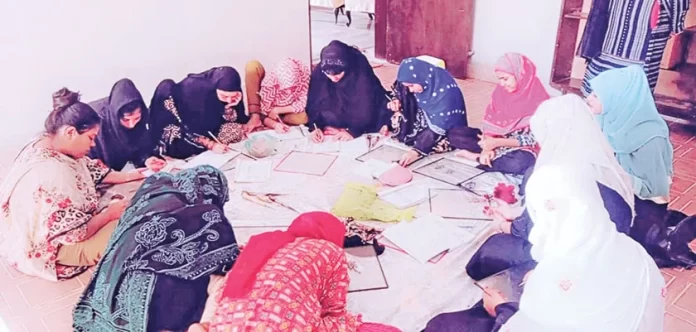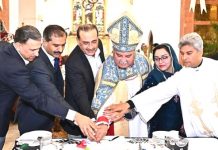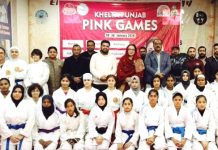Lacking basic reading and writing skills is a tremendous disadvantage. Adult education is an excellent option for those who did not have the opportunity to receive proper education at a younger age. When individuals learn how to read, write, do basic math, and use computers, they have the power to lift themselves out of poverty, lower healthcare costs, find and keep sustainable employment, and ultimately change their lives.
Breaking the cycle of illiteracy and improving self-esteem is crucial for women and girls in the developing world. By enabling them to become economically productive and independent, they become empowered and can take control of their lives. Keeping that factor in mind, two committed individuals Zainab and Mansoor launched Amna Shamima Foundation (ASF) to initiate it’s Adult Literacy Project (taleem-e-balighan) for those who were deprived of seeking education and missed that chance in life.
The Amna Shamima Foundation (ASF) opened up in a small shanty town near Karachi in 2022. ASF formally launched its activities in September 2022 in a two-storied purpose-built structure constructed by Zainab and Mansoor from their savings. The basic idea is simple; the aged and the elderly impart their skills and wisdom to the young. This is done through introducing vocational courses, adult literacy classes, and community events. Foundation’s Skills Development Programme was the first to launch including sewing-cutting, embroidery, and mehendi application classes for women. The foundation committed to addressing holistic needs of the people it serves, it also plans to organise medical camps in partnership with doctors and non-governmental organisations which are active in the area.
Two distinguished educationists:
Two female educationists are continuing to give to the world after their deaths, as their children have opened a foundation in their names to uplift an underserved community in Karachi. While talking to this scribe, Zainab and Mansoor Raza explained that the idea took root as they both watched their respective mothers’ continued desire to lead fruitful lives after their retirement from active service in the education sector.
Mansoor Raza’s mother, Mrs Shamima-Tul-Hussain Raza was a lifelong educationist, a taciturn feminist and a voracious reader of English Literature. Born in the year 1933 in the old city area of New Delhi, India, she migrated along with her surviving mother and six sisters to Karachi, Pakistan in 1947.
Ever since she was a child, she was a very headstrong person. Her love for education was evident from an early age when she taught her younger sisters. When she migrated to Pakistan, she was one of the oldest children of a family without a male figure, so she took the responsibility of running the household. At the age of fifteen, young Shamima was teaching younger kids to support her family while continuing her own education. In 1964, she was awarded a scholarship to complete her Master’s in English Literature at the American University of Beirut, Lebanon. Throughout her adult life, she was known in her neighbourhood for teaching children free of cost and encouraging them to continue their education. She did her Master’s in Education in 1976, under the supervision of noted Educationist and the then Principal of Habib Public School Dr A.H. Rizvi famously known as ‘Rizvi Sahib’.
She was also known for her feminist viewpoint which was reflected in her actions, despite living in a conservative society. Her lifestyle remained simple and frugal with more emphasis on development of moral self than outward appearance. Her guiding principle in life was honesty as she once said, “Honesty is not the best policy, it’s the only policy”, while dealing with human beings. She retired as Principal of Maulana Hasrat Mohani Government Girls Secondary School, Buffer Zone, Karachi and breathed her last on July 18, 1997.
Zainab Raza remembers her mother, Mrs Amna Kamal Minai, as a soft spoken, yet headstrong woman who lived a full life of an educationist and mentor to thousands of women in her career as a professor of Urdu in Sir Syed Girls College, Karachi. The granddaughter of Lucknow’s famous poet, writer and lexicographer Ameer Minai, Amna was born in Rampur in 1933 in a household steeped in erudition and culture. An outstanding student from the beginning, she completed her Intermediate Certificate from Jamia Usmania in Hyderabad Deccan. Her family migrated to Karachi in 1950 after which she passed her B.A. and her degree of Adeeb Fazil from Lahore and her M.A. from Karachi University with distinction. At that time, Sir Syed Girls College was in the early stages. She was selected to be a part of this institution and quickly became an active and responsible member of the faculty, rising to the post of the Principal before retiring in 1993. Although, she had no sight in one eye owing to a childhood accident and suffered from glaucoma in the other eye, she relentlessly pursued her passion of reading and literature.
She was instrumental in forming several literary societies and events at the college as well as mentoring talented girls to live up to their potential. Saeeda Gazdar, Shakeela Afzal, Parveen Shakir and others are among her students. She continued to write and translate books and articles after her retirement. Mrs Amna Kamal Minai, with her sweet nature and generosity of spirit, was loved and respected by all those who came across her.
By offering skills development and literacy, and instilling the same values and principles that they lived by, the foundation is ensuring that the legacy of these illustrious women lives on, and their impact on the world continues to be felt even after they are gone.
Opportunities for learning and growth:
“By creating a space for the transfer of skills and wisdom from the aging population to the youth, ASF is helping to ensure that the knowledge and experience of older individuals is not lost, but instead is passed on to future generations,” explains Zainab. By fostering positive relationships between the generations and providing opportunities for learning and growth, ASF is working to build a stronger, more resilient and more connected community, and it is a valuable asset to the people it serves. The foundation offers students an opportunity to learn, grow and develop, just as the two educationists did during their lifetime.
The foundation is located in Haji Ghulam Zakarya Goth, Gadap Town, District Malir of Karachi. It is a low income settlement with significant religious and ethnic mix. Initial reports suggest that some 2,500 households are established and all of the plots are non-leased. Women usually work as maids in affluent households and men work as gardeners, carpenters, welders, drivers and others. No clinic, government school, or post office exists in the area.
By offering household skills training to women and literacy programmes to adults, the foundation is addressing important needs and helping to improve the lives of people in the community. This not only honours the memory of the two educationists, but it also helps to break the cycle of poverty and improve the future prospects of those who attend the programmes. By equipping people with the skills and knowledge they need to succeed, the institution is helping to build a stronger and more vibrant community, and it is a testament to the lasting impact that the two female educationists had on the world.
“The enthusiastic response of women in the area to join classes, both to learn and to offer support, highlights the need for these kinds of initiatives and the appreciation that people have for the efforts being made to improve their lives,” shares Zainab. “This response shows that the institution is filling a vital gap in the community, and that it is providing a valuable service that is making a real difference in people’s lives. The women’s eagerness to participate and support the initiative is a powerful reminder of the positive impact that education can have on individuals and communities,” she expresses.
Empowerment of women:
Focusing on the education and empowerment of women and girls is indeed a long-term solution that can have a lasting and far-reaching impact. “By working specifically with this population, the institution is not only addressing a significant need, but it is also building trust and goodwill within the community,” elucidates Mansoor. He describes his assessment of the impact this foundation aims to make. “When women and girls have access to education and are empowered with the skills and knowledge they need to succeed, they are better equipped to contribute to their families, communities and society as a whole. This leads to a more positive and sustainable future for everyone,” he stresses. “The prime objective is to empower women with different skills to explore their potential, as well as to generate income for becoming self-reliant. As a next step, we aim to connect them with the mainstream local market, so that they can tap opportunities for acquiring experience,” he elaborates.
ASF has received support from friends, relatives, and board members to help secure the equipment required for its upcoming and ongoing initiatives. The procurement of basic medical equipment to start medical services and computers for the youth will be a significant step forward for the organisation and will help it to expand its reach and impact.
ASF has been able to start its programme with 10 sewing machines and two batches of 20 students. The sewing classes provide an opportunity for students to learn a valuable skill that can improve their future prospects, and the fact that two batches of 20 students each have already started, shows that there is significant interest and demand for these kinds of programmes. “This shows that even with limited resources, it is possible to make a positive impact in the community,” emphasises Zainab.
It is common for running and maintenance expenses to increase as the catchment area of an organisation like the Amna Shamima Foundation (ASF) expands and the number of programmes grows. As the organisation reaches more people and offers more services, there will be a corresponding increase in costs, such as salaries for staff, supplies for programmes, and equipment maintenance, among others. “It is important for us to have a solid financial plan in place to ensure that it can continue to operate effectively and sustain its growth over time. This may involve developing creative solutions to minimise costs, such as partnering with other organisations or utilising volunteers,” points out Zainab.
By opening this foundation, Zainab and Mansoor Raza are not only honouring the memory of their mothers, but they are also making a meaningful contribution to their community by addressing the needs of the people in the area. This kind of dedication and commitment is likely to inspire others to get involved and to make a positive difference in their own communities.














